Ramzy Baroud on the power paradigm that long defined the West’s relationship with Palestine and, by extension, the Global South.
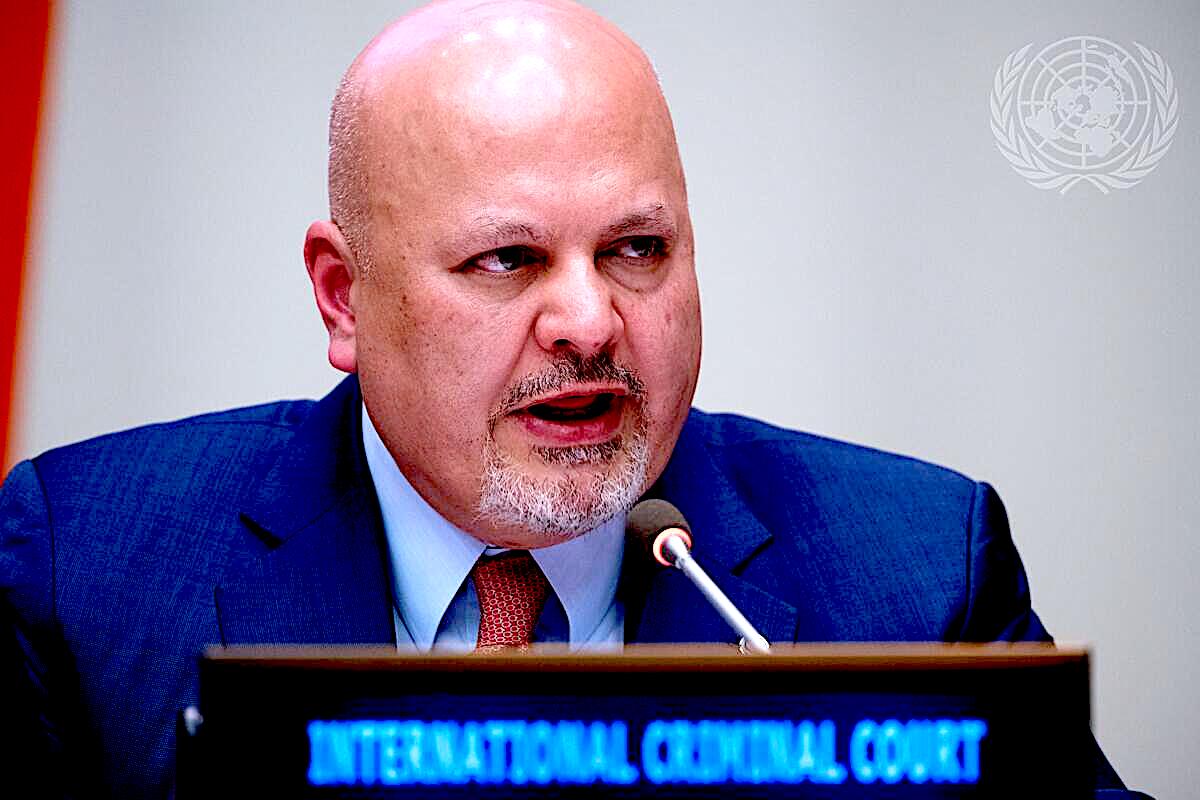
ICC Prosecutor Karim Khan addressing the U.N. Security Council in 2022. (UN Photo/Evan Schneider)
 Even the most optimistic of political analysts did not expect that the International Criminal Court’s Chief Prosecutor would be uttering these words:
Even the most optimistic of political analysts did not expect that the International Criminal Court’s Chief Prosecutor would be uttering these words:
“I have reasonable grounds to believe that Benjamin Netanyahu (…) and Yoav Gallant (…) bear criminal responsibility for (…) war crimes and crimes against humanity …”
Aside from the two Israelis, Karim Khan has included three Palestinians on his application requesting arrest warrants from the ICC’s Pre-Trial Chamber. That is important, but we must remember that, per Western thinking, Palestinians have always been the guilty party.
Evidence of the above claim is that the West has long portrayed Israel as a country at war in self-defense. Consequently, Palestinians — though occupied, dispossessed and disinherited — are the aggressors.
This bizarre logic is not strange if seen within the larger power paradigm which has defined the West’s relationship with Palestine and, by extension, the Global South.
For example, out of 54 individuals indicted by the ICC since its inception in 2002, 47 are Africans, a fact that has rightly agitated governments, civil societies and intellectuals throughout the Global South for many years.
On Western duplicity, Aimé Césaire, a Martinican intellectual and politician, wrote,
“they tolerated (..) Nazism before it was inflicted on them, they absolved it, shut their eyes to it, legitimized it, because, until then, it had been applied only to non-European peoples.”
World War II inspired new thinking on the part of the West. The International Court of Justice (ICJ), the ICC, among others, have been the direct outcome of that terrible Western war. It was the West’s way of trying to protect the new status quo which was established by the victors.
Please Donate to the
Spring Fund Drive!
The Global South joined in anyway. “Africa had a particular interest in the establishment of the court, since its peoples had been the victims of large-scale violations of human rights over the centuries,” a representative of the Organization of African Unity said in Rome, the birthplace of the Rome Statute, in 1998.
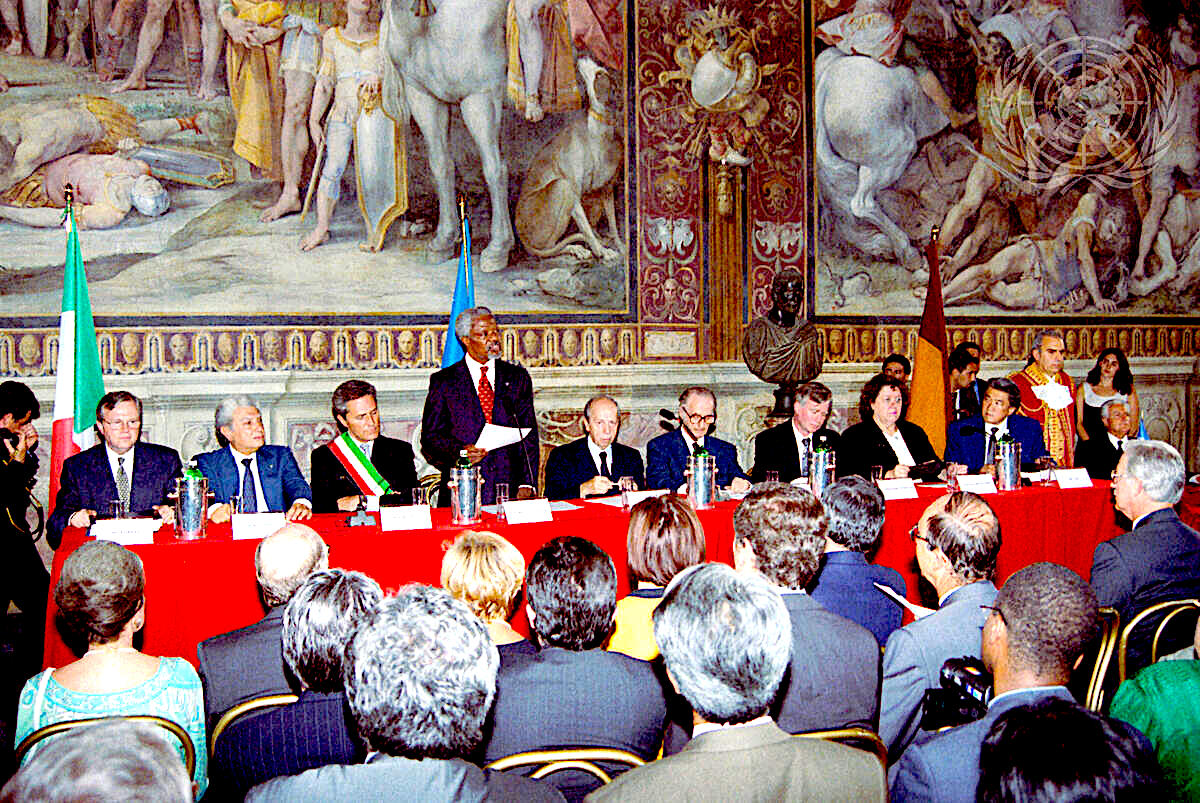
U.N. Secretary-General Kofi Annan on July 18, 1998, addressing the ceremony in Rome’s City Hall to sign the treaty establishing the ICC. (UN Photo)
Predictably, however, the ICC turned into a platform where former colonial masters cast judgment on the non-European world. In that sense, justice was hardly served.
As always, Palestine has, and continues to serve as the litmus test of the international order. For over 15 years, Palestinians have been seeking to enlist the ICC’s help to hold Israel accountable for its military occupation and various crimes in Palestine.
The Palestinians have done so simply because any attempt at establishing a practical mechanism to end the Israeli occupation through the United Nations has been met with a cruel American veto.
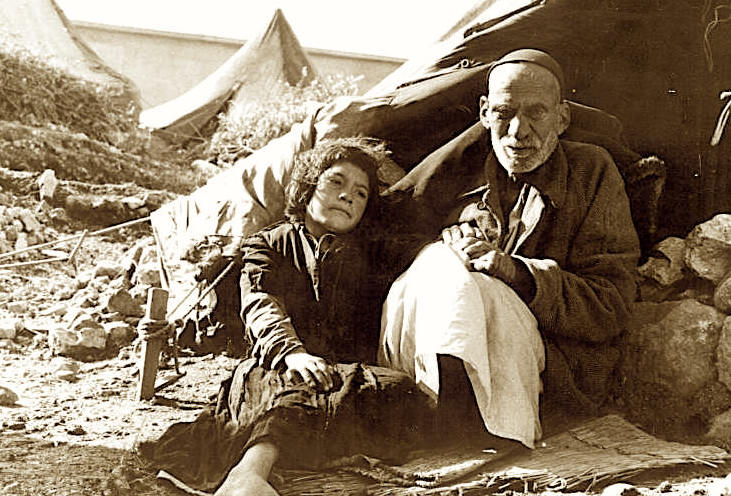
Sudden refugees forever, Palestine Nakba 1948. (Hanini, CC BY 3.0, Wikimedia Commons)
As the Israeli occupation turned into a permanent one, and racial apartheid spread its tentacles to cover every inch of Palestine, the U.S.’ support of Israel has become a first line of defense against any international criticism, let alone action, aimed at reining in Israel.
Even though the U.S. has refused to join the ICC, it still has great influence over the organization, either through sanctions or pressure imposed by its allies which are members of the court.
Thus, the ICC procrastinated. Decisions that should have taken only months, took years to be made. The institution, which was created to deliver swift justice, became a bureaucratic legal apparatus that did everything in its power to escape its responsibilities towards the Palestinians.
The persistence of Palestinians and the massive solidarity they have obtained from countries throughout the Global South, eventually paid off.
In 2009, Palestinians filed their first application to join the ICC. Yet, it took over three years for then-Prosecutor Luis Moreno Ocampo to reach his decision, in 2012, denying Palestinians such urgent membership on the account of their legal status as mere observers at the U.N.
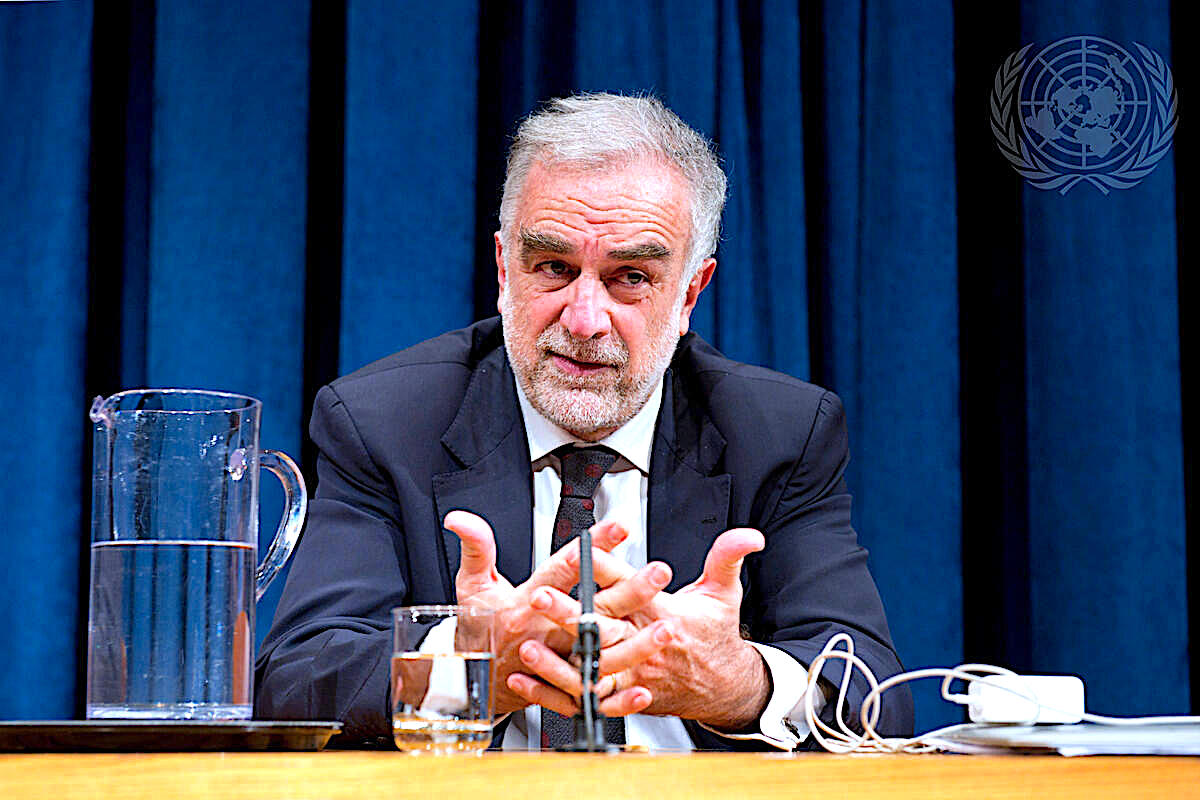
Luis Moreno-Ocampo, outgoing prosecutor of the ICC, on June 5, 2012, following his final briefing to the Security Council. (UN Photo/Eskinder Debebe)
The rest of the world rallied behind Palestine again and, later that year, the U.N. General Assembly granted Palestine its “non-member observer state” status.
It took another three years for Palestine to officially join the ICC. Four years later, in 2019, then-Prosecutor Fatou Bensouda stated that the so-called statutory criteria needed to begin an investigation in Palestine were satisfied.
But, instead of opening an investigation, Bensouda sent the matter back to the Pre-Trial Chamber for further confirmation.
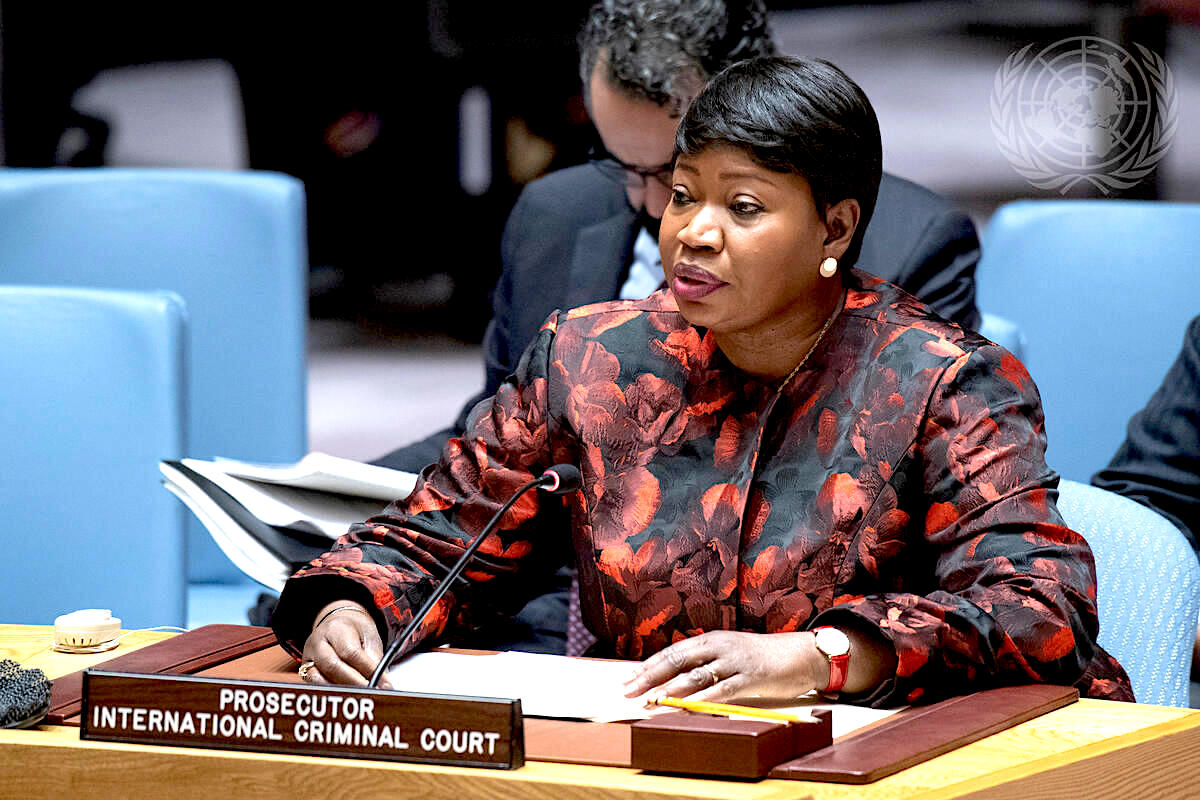
Bensouda at the U.N. Security Council in December 2019. (UN Photo/Eskinder Debebe)
An official investigation was not opened until March 2021, but ground to a halt when Karim Khan replaced Bensouda as the chief prosecutor later that year.
So what happened between March 2021 and May 20, 2024, that allowed the ever-reluctant Khan to go as far as requesting arrest warrants?
First, the Israeli genocide in Gaza, where victims are measured in the tens of thousands.
Second, the credibility of the West-enshrined legal system which has governed the world since WWII, was at stake. This explains the emphasis made by Khan in his May 20 statement:
“If we do not demonstrate our willingness to apply the law equally (…) we will be creating the conditions for its collapse.”
Third, the solidarity of the Global South, which has served as the backbone of all Palestinian efforts at international legal institutions.
After decades of a one-sided approach to global conflicts, the pendulum is finally shifting. Indeed, when we say that Gaza is changing the world, we mean it.
Ramzy Baroud is a journalist and the editor of the Palestine Chronicle. He is the author of five books including: These Chains Will Be Broken: Palestinian Stories of Struggle and Defiance in Israeli Prisons (2019), My Father Was a Freedom Fighter: Gaza’s Untold Story (2010) and The Second Palestinian Intifada: A Chronicle of a People’s Struggle (2006). Dr. Baroud is a non-resident senior research fellow at the Center for Islam and Global Affairs (CIGA), Istanbul Zaim University (IZU). His website is www.ramzybaroud.net.
This article is from Z Network.
Views expressed in this article and may or may not reflect those of Consortium News.
Please Donate to the
Spring Fund Drive!



Khan may well be correct that if the institutions of international justice do not take Israeli crimes seriously and move to prosecute them according to those laws, we may soon find ourselves on a planet without even those nominal laws.
WHY??? the Hamas leaders. Is it a crime to try to defend oneself? Why are 76+ years of Zionist’s atrocities against Palestine always brushed aside – cloaked in silence?v Palestinian deaths don’t count? And didn’t the Jewish Haganah commit plenty acts of terror while israel was being established? The bombing of the King David Hotel in Jerusalem against Brits comes to mind. The West’s behaviour is utterly shameful and a disgrace to humanity.
Today, large crowds of Israelis are storming the mosque in Jerusalem, and holding marches through Old Jerusalem (illegally occupied per UNSC resolutions), chanting “Death to Arabs”. Today this march will be led by a prominent cabinet minister.
A national holiday celebrated with racial chants of death towards a hated and despised race …. and people wonder why this nation can be accused of genocide?